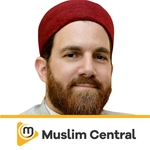Walead Mosaad – Speech In Al Firdaus Ensemble Concert Lehigh University

AI: Summary ©
The speaker discusses the importance of tunes in the context of global warming and the rise of Christian and Muslim philosophers. They also mention the importance of religious audition experiences and the practice of holyure. The speaker hopes that these experiences will be a memorable day and will linger on until Thanksgiving.
AI: Summary ©
And that you want immunity to the products on some man officiates
interfaith coexistence musical event sponsored by the university
champions, as well as global warming Global Union, and civic
community and local nonprofit.
So we're gonna get started a little bit, but I thought I tried
to give him a little bit of a background about kind of the
tunes. And the themes that you'll be hearing tonight.
A lot of the tunes that they'll be singing comes from ancient themes
that trace back to ambition, Spain, and as many of you are
aware of, there was a period in Spain, under the auspices of
mostly Muslim rule, that there was a flourishing of three faiths,
namely, Christianity, Judaism, and Islam. So some of the greatest us
philosophers came out of
academician and the Muslim philosophers as well. And also
Christian philosophers and some of the greatest music. So it was kind
of that we're at a point in history, where we have this
confluence of different backgrounds, different languages,
different religious perspectives, but in a matter that maybe wasn't
100% harmonious all the time, but to a great degree, actually
produced a lot of the world's greatest literature and music, and
so forth. So they have a lot of influences on their music.
Flamenco. You're going to hear to Arabic beginning a little bit,
even Celtic themes. Tonight, Sharla, God willing.
Also, for Muslims, this is a very auspicious night, because it's the
commemoration of the birth of the Prophet Muhammad that Muslims
revere as the final and last and revered Prophet office lamp. And
these types of events, sometimes they're referred to as mobileread,
which simply means commemoration of a birthday. And you also find
in traditional Muslim texts, the idea of what we're going to do
here tonight, or audition is referred to as religious
experience. And you'll find in religious texts that there's
chapters about how does one benefit from spiritual audition,
how does one benefit from music from words, and allow them to
penetrate the heart and entertain the soul, so that they themselves
can become enlivened knowledge, not just with the tunes, and the
rhythm, but also with the music itself and the meanings. And this
is the practice in the Muslim world today. Both the Jewish and
Christian traditions also have forms of this Buddhist tradition
has forms of this. So, you know, I think we're living in uncertain
and maybe difficult times, in many ways.
Last month, or maybe earlier this month, myself, and Rabbi Steve
Nathan was here tonight and university champion, Dr. Lloyd
Stephen, we came together to do a vigil with the Pittsburgh shooting
synagogue shooting in Pittsburgh, at the Tree of Life synagogue. And
we both spoke here, and there was quite a number of students who
came out. And I had mentioned that night that it seems to keep coming
together for these sorts of things. And so the inevitable that
somehow we come together once again, to talk about tragedy, and
how to cope with it and get through it. And I'd like to see a
world where people of different perspectives and backgrounds and
languages and ethnicities and religions can come together to do
something positive, and come to something that will not only
help them to cope with everyday life, but to move on to a plane to
a place where we're not just surviving, but we're thriving.
And I think too many of us were just sort of trying to get by, as
it were, you know, make it through the day, make it through the week,
make it through the month. And as human beings, I think the world
speaks to our intellects to our mind, but I also think it speaks
to our heart. I think the shorter route, and the shorter route is
the heart. And music has the ability to do that. It takes a
direct line to the heart, when it penetrates. It has the ability to
bring people together. It has the ability for people to gloss over
the differences and move on and think about the common humanity
between them all. And so I'm hoping that this type of events,
very excited and proud that we got support from the organizations
that I've been to have a lot of great thanks to Dr. Lloyd Stephens
University chaplain and Rabbi Steven Nathan and also the
coordinator of the chaplains office.
I'm terrible because for helping us and putting out this event and
we have a myriad of volunteers also that came together. So
hopefully, this will be a memorable day. We won't just think
about it while we're here but it will linger with us even for just
a bit. At least through until Thanksgiving turkey dinner. I
think we would have done what we've set out to do here. So
without really further ado, I asked the furnace ensemble take a
stage and get ready for for some good distinguish our Thank you